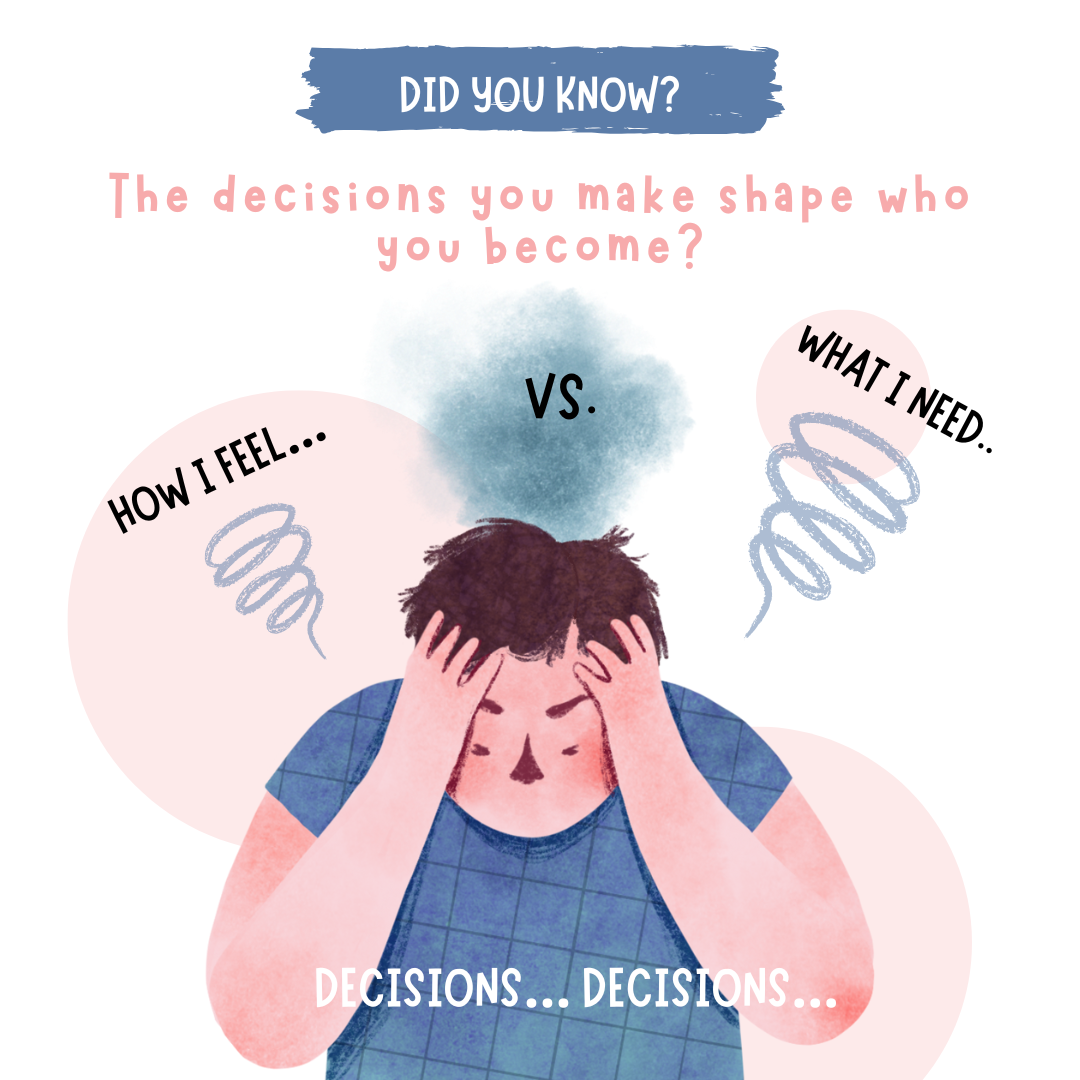By Keanna Marquez
Decisions are choices we make and we make these choices all day, everyday. And the choices/ decisions we make determine who we become!!!
According to Psychology Today, a media and news outlet that reports about mental health and behavioral science, most people’s decisions are influenced by their “biases, emotions, and memories.”
Do you know how dangerous that is, to base something so important, so influential on your emotions and memories?!
I don’t know about you, but it’s Wednesday and I can barely remember what I did last weekend and now, after years of practice and intention, my emotions are much more stable, but I couldn’t imagine what my life would be like if I let my 19-23 year old, always-angry emotional self make life-changing decisions for me!
If I had let my emotions drive my decisions back then I’d be depressed, motionless, stuck in a life I hated, beating myself down constantly, but instead, I let my goals drive my decision making!!! My goals determined my work ethic for the day, my attitude, my attendance, my habits and for that reason I succeeded, made it out alive, and achieved some pretty awesome goals along the way!
Now, after years of tracking and using my personal data, my data is the main influence in my decision making process!
According to Tableau, a platform that specializes in using data to problem solve, “data-driven decision-making is defined as using facts and data to guide strategic business decisions that align with your goals, objectives, and initiatives.”
I’ve said it before and I’ll say it again, we should be running our personal lives like a business: track and use our data, make data-driven decisions, use KPIs, hire goal managers, the list is endless!
Now, instead of using our emotions to make decisions, we’re using facts and data, which means our decisions will be far more successful in helping us create better lives for ourselves!
Let’s say you wake up miserable every single day to go to work, you’re exhausted, not in a good mood, lacking desire and motivation and are just plain miserable. Your bias and your emotions will probably tell you that you hate your job, so you should quit.
If you’re following an emotional-based decision-making process then you’ll likely quit your job after a handful of these miserable mornings!
Now, let’s say while having these miserable mornings you were also tracking your personal data all day, everyday. So before making this big decision, we stop to review your data.
With weeks and months worth of data, we’re able to find that you’re staying up each night until midnight or 2:00AM, knowing that you have to be up at 7:00AM to get ready for work. And while up late at night you’re playing video games, consuming unhealthy drinks and snacks, consuming unhealthy content, and aren’t getting enough sleep, which is the REAL reason why you’re so miserable in the mornings!
So, using a data and fact-based decision-making process, you make the decision to create healthier night-time habits like set a boundary of not staying up past 11:00PM to ensure you get at least eight hours of sleep, cut off the consumption of unhealthy content and food and you still have your job which you probably liked in the first place!
See the difference, see the impact? Let me show you how this process works for me:
- I set my goals of wanting to be happier and healthier.
- I design my data spreadsheets accordingly
- I track and use my personal data all day, every day.
- My team and I analyze my data and create data-summary reports
- I use these reports to decide if change needs to happen or if I’m ok and on track to reach my goals.
Sample of my raw data:
Sample of my data-summary reports:
- Consistency Tracker
Decision making is much easier, much more reliable, and much more effective when relying on your personal data to help you do the job!
Below are some key decisions I’ve made based on my personal data:
- I stopped consuming unhealthy and negative content: shows about rape, murder, or any type of violence, news outlets reporting nothing but the bad and horrendous things in the world, music with inappropriate lyrics, etc.
- Saw I was spending too much time on Instagram and that it wasn’t improving my mental health or well being in any way so I deleted it all together!
- Set boundaries with people in my life who were draining me.
- Cleaned up my diet: began eating less and less junk food and drinking less and less alcohol.
With these key decisions, along with many others, my life has improved drastically!!! I’m the happiest and healthiest I’ve ever been, I have been able to channel and use my time and energy on pursuing incredible things like writing a book and starting my own business!!!
Your emotions are probably involved at this very moment while you’re trying to decide whether or not to start tracking and using your personal data and they’re probably telling you not to, that it’s too hard, looks too complicated, or is an overreaction, but what is the data telling you?
Go follow business success stories of companies that rely on data to make key decisions, look at my success story, and review your past decisions that you’ve made based on your feelings or emotions. What’s the data telling you?
Start running your life like a business, a very successful business, start tracking and using your personal data to make decisions and to help you create and live a better life for yourself!
Learn more in my book, Your Life in Numbers, read some of our other blogs, and hopefully start working with us! Until then, happy tracking!
